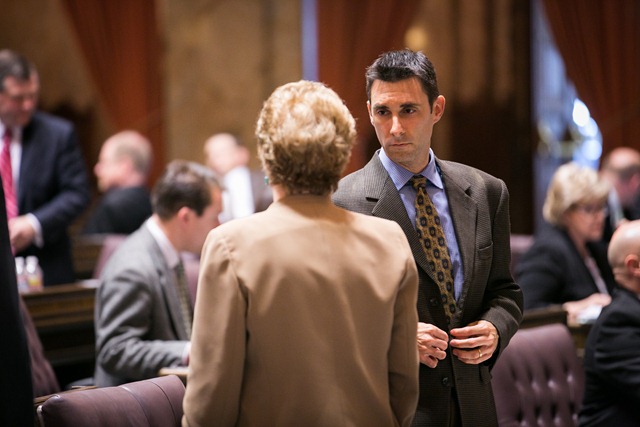In her story Northwest Abolitionists, Lucy Austen outlined the work that the advocacy organization Shared Hope is doing to combat sex trafficking in the Pacific Northwest. Non-profits like Shared Hope, which are organized to protect victims, support survivors, and educate lawmakers, have made real change in our communities. But, as Austen points out, if we are to turn this problem around it will take the joint effort of a variety of institutions that make up civil society.
Washington State Representative Kevin Parker, Spokane, is leading the way in demonstrating the role that government can play in this fight as it partners with the non-profit sector. His story is an interesting one in this day of conflict between factions of political parties.
Though Parker graduated from Whitworth University in Spokane with a political science degree he did not immediately consider a career in government. After college he worked for Young Life in Colorado and was in the cafeteria on April 20, 1999 at Columbine High School when two teenagers dressed in black began shooting. Crouching with students behind tables he prayed, knowing he was at risk of having a “truncated life,” missing out on having children with his wife Kerry. That day he promised God that if his life was spared he would spend his life serving God with deliberation and compassion.
In the year following the Columbine shooting Kevin and Kerry worked with the high school students that suffered in the aftermath of the tragedy. Members of the community had made a covenant that they would not speak publicly of the event for at least a year in order to avoid sensationalizing it. But, just shy of a year after the tragedy, Kevin was asked to be a keynote speaker at the Idaho governor’s prayer breakfast. After consulting with the Columbine and Young Life communities, he agreed to talk about the impact the tragedy had had on him. On the plane after the breakfast Kevin sat next to Idaho governor Dirk Kempthorne. Kempthorne talked to Parker about Jesus, being a disciple and what God’s call in politics means to the Kingdom of God on earth. Kempthorne encouraged Kevin to consider politics.

A few years later Kevin met with Mark Hatfield who had just retired as a U.S. Senator from Oregon. Hatfield, author of books, Between a Rock and a Hard Place and Against the Grain: Reflections of a Rebel Republican encouraged Kevin to study the work of Mother Theresa and Catholic priest Henri Nouwen. Mother Theresa served the poor with a dedication matched by almost no one. Nouwen encouraged people to seek peace, and protection of the poor and weak as he emphasized God’s unconditional love and forgiveness. Senator Hatfield encouraged Parker to focus on Jesus and to try and see truth on both sides of an argument.
Parker was inspired by Hatfield and continued to think about political life. Eventually, he finished an M.B.A. at George Fox University and opened Dutch Brothers coffee franchise stores in Spokane. In 2008 he was approached to run for Spokane Washington’s 6th legislative district. His win that year is widely attributed to the doorbelling that he did. As he knocked on doors and talked to people about the things they were struggling with he became convinced that economic challenges were at the root of so much suffering in Spokane County. Since 2008 Parker has served in the Washington State Legislature where he has held a leadership position in the Republican Caucus for six years.
For Representative Parker the key to national government has to be a focus on national security but the key to state government is in a fiduciary responsibility to keep the community afloat. A healthy economy must be connected to a holistic understanding of policy that recognizes a legislator’s actions must be Christ-like. It is only through keeping an eye on the most vulnerable that we truly follow Christ. Parker says that Corinthians 4:20 shapes his actions on a day-to-day basis: “For the Kingdom of God is not a matter of talk but of power.” And, he says that power must be exercised through relationship. It is only through relationship that good policy can emerge.
What does this mean for government? Parker says that policy has a role to play but government cannot solve the issue of poverty by itself. Sometimes the church can better address challenges people face, mostly because the church can love others. A combination of government, the church and other institutions in society together will make a difference in the world.
Parker focuses on three things as he seeks to be Christ-like in relationships and policy: jobs, education and care for the vulnerable. In an interview conducted by Christianity Today he said, “I believe every human being wants to be known and loved and seeks purpose. Jobs help build some of that, education prepares people for the next steps in their lives, and Scripture is very clear that widows and orphans are very important to Jesus.”
In his focus on the vulnerable, Parker reaches across the aisle to work with legislators in both parties. But, he does not rely on political parties to tell him what is important for a community. He holds town hall meetings at a men’s homeless shelter and he listens to foster care teenagers to understand the impact of budget cuts on people’s lives.
Parker has co-sponsored legislation to extend Washington’s foster care support to teenagers past the age of 18, and he is working with churches to help focus attention of the plight of foster care children in his community. The Embrace Oregon program was begun by a Young Life team that worked with him years ago and Kevin is interested in duplicating this model in Spokane.
In addition, Parker has sponsored legislation to increase penalties for human trafficking. Built into the legislation that passed last year is a provision that keeps the penalties traffickers pay in local jurisdictions to set up educational and community resources for victims of trafficking.
In his work on both foster care and trafficking Parker demonstrates a commitment to partnership between government and other institutions in society. Furthermore, he sees an important connection between today’s youth and the future of a healthy community. In January 2013 Parker took a group of Whitworth University students to Olympia to help educate legislators about trafficking. He argues that transformational leadership often comes from the younger population and says that legislators have to learn from and help maximize the passion of youth in their constituencies.
In a political environment where Democrats, Republicans and Tea Party members often demonize each other, Kevin Parker highlights for us what faithful Christians can do in politics. Governments, churches and other institutions in society are all a part of working toward God’s Kingdom in a world that is suffering.


